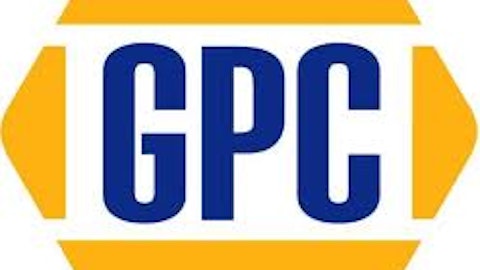Competitive Advantage
Genuine Parts Company’s competitive advantage comes from its extensive distribution network, combined with its trusted brand names.
The company has built an extensive supply chain network through North America over the last 87 years. This distribution system gives the company the ability to quickly supply retailers and small stores with the parts and supplies they need. To compete with Genuine Parts Company, a competitor would have to outlay a substantial amount of capital to build the infrastructure that Genuine Parts Company has built over the last 87 years.
One does not have to drive far to find a NAPA auto parts in most areas of the United States. The company has over 6,000 locations in the United States. The sheer number of NAPA auto parts locations gives the company an edge over smaller auto repair stores.
The company’s franchise business model has allowed it to rapidly expand its territory across the United States. The NAPA brand lets customers know they are going to an established business, not a fly-by-night operation for their auto repairs. The combination of convenience and trust has helped NAPA maintain its growth, earnings, and dividends.
Growth Prospects
Genuine Parts Company (NYSE:GPC) has compounded its earnings-per-share at a respectable 7% a year over the last decade. The company’s dividend payments have grown at 6.8% a year over the same time period.
Earnings-per-share growth has come primarily from increasing sales and share repurchases over the last decade. The company’s net profit margin has been relatively flat over the same time period.
The company is projecting earnings-per-share growth of 7% to 10% a year going forward. I doubt Genuine Parts Company manages to grow earnings-per-share at 10% a year over the long run. A growth rate of 6% to 9% a year is more likely given the company’s history.
This growth combined with the company’s current dividend yield of 2.9% gives investors an expected total return of ~9% to ~12% a year. Not bad for a ‘boring’ business.
Genuine Parts Company took a new step in the company’s growth in 2013 when it acquired Exego. Exego is the leader in automotive parts and accessories in Australia and New Zealand. Genuine Parts Company is investing heavily in the region to build out stores and slowly consolidate the fragmented automotive parts market in Australia and New Zealand. Genuine Parts Company recently added to its investment in Australia by purchasing Covs Parts. Covs Parts has a 25 branch distribution network in Australia.
In North America, Genuine Parts Company will grow by incrementally expanding its various distribution networks as well as through potential small bolt-on acquisitions.
Recession Performance
Genuine Parts Company held up fairly well through the Great Recession. The company remained profitable, though earnings did dip somewhat.
The company’s earnings-per-share through the Great Recession and subsequent recovery are below:
- 2007 earnings-per-share of $2.98 (new high)
- 2008 earnings-per-share of $2.92 (2.0% off high)
- 2009 earnings-per-share of $2.50 (16.1% off high)
- 2010 earnings-per-share of $3.00 (new high)
The automotive repair industry is consistent. People simply must fix their cars regardless of the overall economy.
Valuation & Final Thoughts
Genuine Parts Company (NYSE:GPC) has historically traded for a P/E ratio of between 14 and 17 over most of the last 15 years.
A P/E ratio in the range of 16 to 18 is likely fair value for Genuine Parts Company given today’s low interest rate environment and the company’s solid total return potential and earnings stability.
Genuine Parts Company is currently trading for a price-to-earnings ratio of 18 using adjusted earnings-per-share. The company is likely trading around fair value at current prices.
Genuine Parts Company is a high quality business that has a long history of growth and dividend increases. Genuine Parts Company ranks above average using The 8 Rules of Dividend Investing.
The company garners an above-average rank due to its above-average yield, and stability combined with a fair valuation and solid growth prospects.
Disclosure: None





